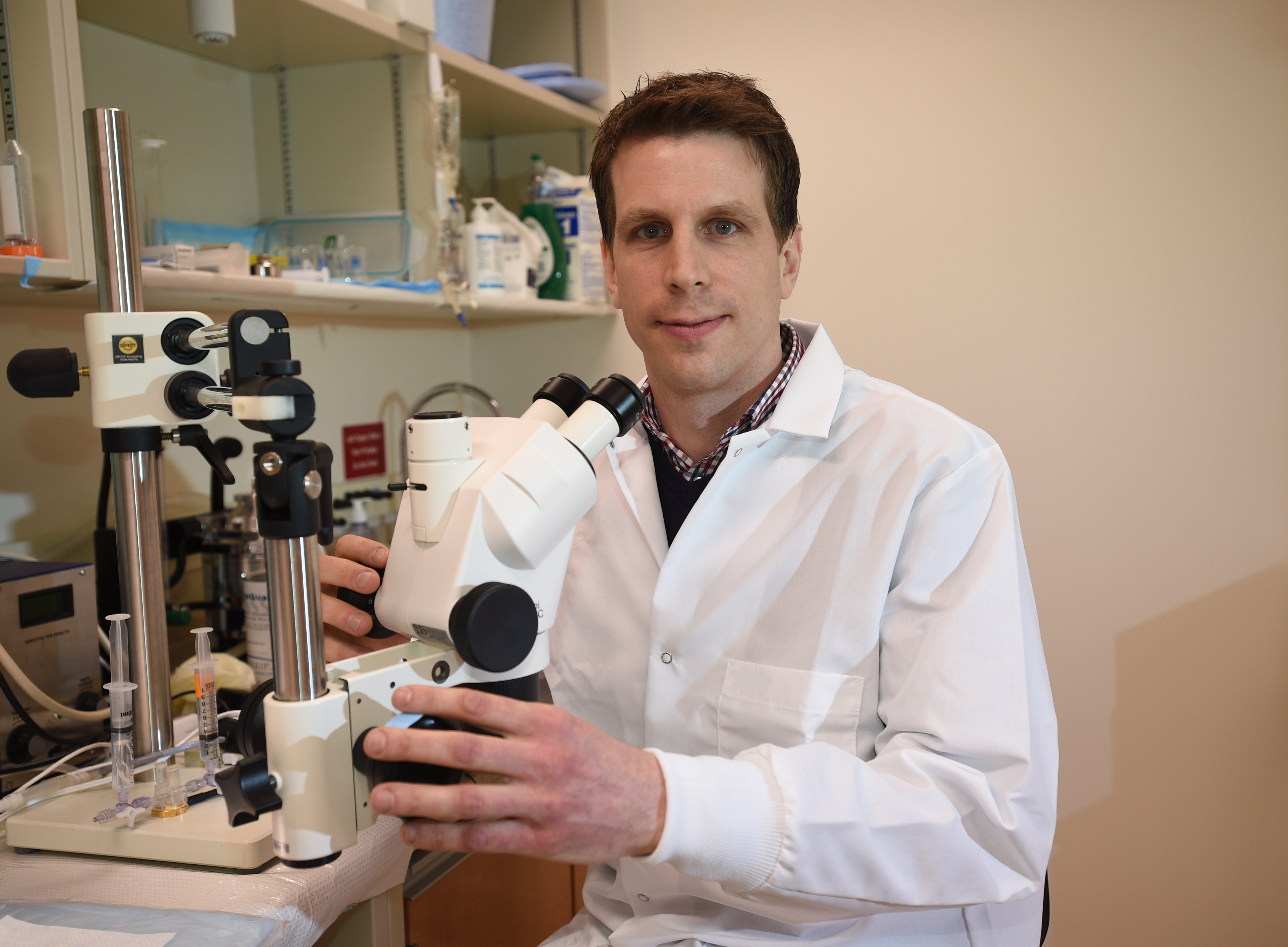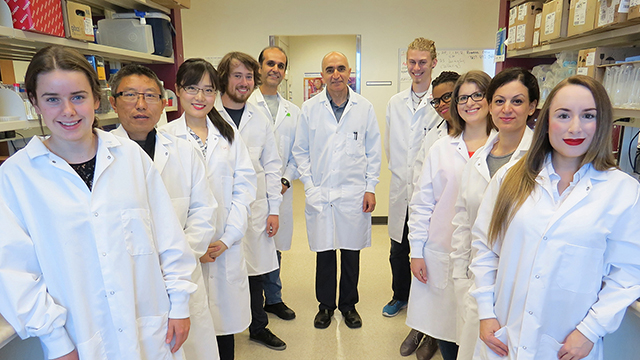
Stephane Bourque
Canadian Institutes of Health Research (CIHR) new investigator awards are given to some of the best and brightest young scientists across the country. In order to receive the award, researchers must have already established a track-record of significant achievement that shows their commitment to research, the originality and the impact of their investigations relative to their career stage. The candidates must be found to be forging an international reputation for excellence in their fields and exhibiting exceptional promise for the future.
This year, two Faculty of Medicine & Dentistry assistant professors received these prestigious awards. We asked them a few questions to help you get to know them better.
Stephane Bourque, assistant professor
Departments of Anesthesiology & Pain Medicine and Pharmacology
Q: Why is your research important to Canadians?
The main focus of my research program is iron deficiency in pregnancy.
It is the most common nutritional deficiency in the world, and pregnant women are among the most susceptible.
In Canada, it's estimated that a staggering one in four women will develop anemia during their pregnancy. We and others have shown that iron deficiency can affect the growth and development of the fetus, which can have long-term health consequences later in life. Given its prevalence and tendency to affect pregnant women, we believe iron deficiency may be an important contributor to the health burden of chronic diseases like cardiovascular disease and obesity. As such, identifying better markers for iron deficiency in the mother and fetus, and developing effective therapies could have a profound impact on the health status of future generations.
Q: What excites you the most about receiving this CIHR New Investigator funding and award?
As a salary award, this funding allows me to devote more of my time to my research program. I love teaching, but it's the research that I'm most passionate about.
As a research group, we've made a concerted effort to ensure that the work we do has potential to improve clinical practice. This of course would not be possible without the clinician-scientists I work with, whose insights into the needs of their patients are arguably the biggest catalyst for new ideas. The thing that excites us the most is the prospect of implementing our findings into clinical practice and improving the care for patients.
Q: What has been the biggest challenge and how have you overcome it?
Like all researchers, I think the biggest challenge that poses a threat to the continuity of my research program is the increasing competitiveness for research funding.
Obviously I have yet to overcome it, being so early in my career but I remain optimistic despite the current funding climate. We've been fortunate so far with operating and infrastructure support, thanks in no small part to my collaborators. All our projects involve clinician-scientists and amongst other things, they provide an extremely important clinical perspective that keeps the research questions centered on patient needs.
Our entire research group is mindful about being adaptive in a research landscape that continues to evolve and priorities continue to shift with the health needs of the population.
Q: What is your greatest success so far?
A: This award is undoubtedly the most prestigious. Because it is based in part on the success and potential of my research program, this recognition as a new investigator really means a lot. It's a testament to the hard work we've made as a group, which includes my collaborators, students and research staff.
Shokrollah Elahi, assistant professorSchool of Dentistry

Shokrollah Elahi (centre) and his team
Q: Why is your research important to Canadians?
This funding will allow me to better understand why a subtype of immune cells called cytotoxic T lymphocytes (Killer T cells) become dysfunctional in chronic viral infections such as HIV, hepatitis C virus (HCV) and cancer.
Unfortunately, cancer is the leading cause of death in Canada and is responsible for 30% of all deaths. An estimated 200,000 new cases of cancer and close to 80,000 deaths from cancer occur yearly in Canada. About two in five Canadians will develop cancer in their lifetime, and about one in four Canadians will die of cancer. The burden of cancer worldwide is equally immense
Viral infections such as HIV, hepatitis B and HCV impose a similarly large burden on Canadians and on our health system.
Cytotoxic T lymphocytes (CTLs) play a crucial role in eliminating virus-infected and tumour cells. CTLs become dysfunctional due to persistent antigens and inflammation in these diseases. This is often associated with deteriorating CTL function, a state called exhaustion. Exhausted CTLs lose robust effector functions such as their ability to produce cytokines, capacity to proliferate, and eventually the ability to kill target cells. Instead, they express multiple inhibitory receptors that render patients unable to mount an effective CTL response against infections and tumours.
Targeting these inhibitory receptors is the forefront of cancer immunotherapy, which invigorates the immune system to fight virus-infected and cancer cells. However, clinical responses so far are mixed. We need to better understand the mechanism of action of inhibitory receptors, their interactions with ligands, the roles of these pathways in immunity to different tumours and molecular and cellular effects of their blockade. I envision that novel, innovative and safe immunotherapy can be developed upon deep understanding of underlying mechanism of CTL exhaustion. My interdisciplinary understanding of the molecular mechanism of CTL exhaustion will lead to future human trials for translation into therapeutics for chronic infections and cancer.
Immunotherapy is the forefront of cancer treatment and developing innovative and more effective immunotherapy will have a significant impact on saving lives.
Q: What excites you the most about receiving this CIHR New Investigator Funding and award?
I am excited to make a difference.The goal of my life as a scientist is to contribute in some way to making things better. I am excited about my breakthrough research that is leading to new targeted treatments for chronic infections and cancer. Instead of a carpet bomb method that sickens a patient and affects even healthy organs and tissues, we hope to develop a personalized approach where a patient's immune system is activated to attack the tumour.
As we understand the secrets of individual tumours, treatments can become more focused. My group will continue to advance our understanding of immuno-oncology and will do it by working smartly, passionately and collaboratively because our goal is to bring new hope to people with chronic diseases such as cancer.
Q: What has been the biggest challenge and how have you overcome it?
I have faced many challenges and obstacles in my scientific and personal life. The only way I have overcome challenges is by working hard, keeping a persistent focus, believing in myself and not allowing the situation to stop me from my true purpose.
Q: What is your greatest success so far?
My greatest success is my demonstrated expertise in the immune regulation field. My research program is a natural extension of my previous work, when we provided the first explanation of how some CTLs in HIV give protective immunity and evade exhaustion.
Meet our partner in innovation
As the Government of Canada's health research investment agency, CIHR supports excellence across all four pillars of health research: biomedical; clinical; health systems services; and population health.
As stated in the CIHR Act, CIHR's mandate is to "excel, according to internationally accepted standards of scientific excellence, in the creation of new knowledge and its translation into improved health for Canadians, more effective health services and products and a strengthened Canadian health care system."